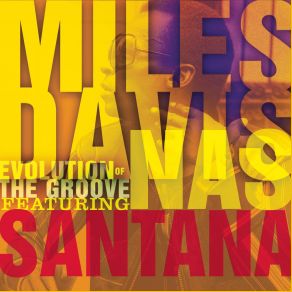Evolution of the Groove (feat. Carlos Santana)
Download links and information about Evolution of the Groove (feat. Carlos Santana) by Miles Davis. This album was released in 2007 and it belongs to Breakbeat , Electronica, House, Hip Hop/R&B, Soul, Jazz, Rock, Dancefloor, Dance Pop, Funk genres. It contains 5 tracks with total duration of 14:30 minutes.

|
|
|---|---|
| Artist: | Miles Davis |
| Release date: | 2007 |
| Genre: | Breakbeat , Electronica, House, Hip Hop/R&B, Soul, Jazz, Rock, Dancefloor, Dance Pop, Funk |
| Tracks: | 5 |
| Duration: | 14:30 |
| Buy it NOW at: | |
| Buy on iTunes $4.49 | |
Tracks
[Edit]| No. | Title | Length |
|---|---|---|
| 1. | Freddie Freeloader (Outtake) | 1:18 |
| 2. | Freedom Jazz Dance (Evolution of the Groove) | 2:56 |
| 3. | It's About That Time (feat. Carlos Santana) | 4:53 |
| 4. | Honky Tonk | 2:39 |
| 5. | Black Satin | 2:44 |
Details
[Edit]Opening with a brief outtake of "Freddie Freeloader" from the Kind of Blue sessions, the Evolution of the Groove EP is an experiment, and an attempt by the Miles Davis estate to bring the late jazz innovator's music into the 21st century, melding it with the art of the remix. The executive producers on this set are Steve Berkowitz and Vince Wilburn, Jr. (Miles' drum-beating, programming ace nephew), with co-production by Wilburn, Pat Thrall, and Charley Drayton. The set is full of "star" quality performances and the set is seamlessly edited to play as a continuous piece of music. Rapper Nas lends his rhymes to the "Freedom Jazz Dance" remix, right over the top of Miles' own directions from the studio outtake, and recorded by the second great Miles Quintet (Herbie Hancock, Wayne Shorter, Tony Williams, Ron Carter, and Davis) with the remix produced by former Davis drummer Lenny White and Wilburn. Other players on the cut include Thrall, Olu Dara on additional trumpet, bassist Victor Bailey, and pianist Geri Allen on Fender Rhodes. It's a bit startling, but works beautifully, especially when it gives way to "It's About That Time" from the In a Silent Way sessions. The original band with John McLaughlin, Chick Corea, Shorter, Hancock, Williams, and Dave Holland is supplemented by Carlos Santana's guitar, Drayton on bass, Allen on Rhodes, and a wild layer of drum programming and percussion. A shorter version of this cut was included on Miles' Cool & Collected compilation, but this one is the definitive remix. As this baby fades, "Honky Tonk" — the version form Get Up with It — emerges. Drayton, guitarist Doyle Bramhall II, and Thrall slip and slide around the original band — Keith Jarrett, McLaughlin, Billy Cobham, Airto, and Hancock.
Finally, one of Miles' signature tunes is given a brief remix treatment here with "Black Satin" from the immortal and terminally misunderstood (at the time) On the Corner, Miles' most controversial LP. The remix by Thrall and Drayton contains the pair layering bass, drum programs, hand percussion, and guitars over the track, which was already full of killer sounds and grooves from Badal Roy, sitarist Khalil Balakrishna, saxophonist Carlos Garnett, Bennie Maupin on bass clarinet, keyboardists Corea and Hancock, bassist Michael Henderson, guitarist David Creamer, and the trio of drummers Billy Hart, Al Foster, and Jack DeJohnette. The real question here is, does it work? The answer is, in its context, yes. One needs to remember that Miles and Teo Macero extensively edited from original tapes; they spliced tape and chopped sections of different takes into a single tune. This is also the second time — officially — that remixing Davis' work on the longer-play scale has been done. Bill Laswell did it in 1998, also using material from On the Corner, In a Silent Way, and Get Up with It. Laswell's motivation was different. He was attempting to create a dark sound piece that evoked the spirit of Miles in his own manner of hearing. The goal here is to show how easily Davis' music is at the heart of much of what is happening in the 21st century and lends itself to the now fine art of the remix. As such, it is an effective 15-minute-long swathe of funky grooves, surprising breaks, samples, funk, jazz, and hard rock. It's an excellent, cohesive, and aggressive listen that will no doubt serve as the root material for other remixes and would actually work well on the floor of a progressive dance club when played by an astute DJ. The only complaint is also the blessing: it leaves the listener wanting more, much more. Hopefully there are other volumes with different producers waiting to step up and dig into the Davis catalog.